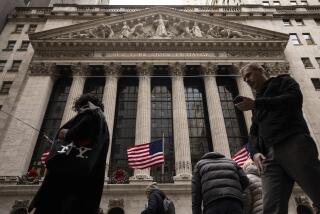‘Obamacare,’ fiscal cliff leads to small business optimism plunge
- Share via
American small business owners are in a sour mood, with optimism at one of its lowest levels since 1986, but don’t blame Superstorm Sandy.
It’s the fiscal cliff’s fault, according to a new report from the National Federation of Independent Business. The threat of major spending cuts and tax hikes in the new year has caused a forward-looking gauge of Main Street sentiment to plummet.
The election and the looming implementation of President Obama’s health coverage overhaul is also weighing on small business owners, according to the report. Sandy, which battered the East Coast in October, had a minimal effect.
The NFIB index plunged 5.6 points in November to an 87.5 reading from 93.1 in October. The measure is calculated against a baseline of 100, set in 1986 when the organization first began tracking monthly data.
November’s score is the lowest since March 2010. In 26 years of records, the drop is one of the biggest. Since 1986, the only readings to show more depressed feelings came during the recent recession and its sluggish recovery.
“Between the looming ‘fiscal cliff,’ the promise of higher healthcare costs and the endless onslaught of new regulations, owners have found themselves in a state of pessimism,” said NFIB Chief Economist Bill Dunkelberg in a statement. “We are forced to ask: is this the new normal?”
Quiz: How much do you know about the ‘fiscal cliff’?
Eight of the 10 components measured by the index fell.
Plans by small business owners to boost employment are up, but still weak. So is the status of current job openings.
But a smaller portion of bosses expect better sales, improved credit conditions, expansion and capital spending opportunities in the months ahead, according to the report. The share of business owners who expect the economy to perk up line sank 37 percentage points to a net reading of minus-35%.
NFIB determines its overall figures by calculating the percentage of respondents with positive answers, subtracting the percentage with negative responses and then making seasonal adjustments.
A net 79% of business owners said they kept employment steady in November. Nearly a quarter of all bosses call out weak sales as their top problem.
Weak consumer spending means that fewer businesses were able to raise their prices to match inflation, according to the report, which surveyed 733 owners.
“Overall, this is a poisonous climate for investment and expansion,” researchers concluded.
Last week, a leading measure of consumer confidence from Thomson Reuters and the University of Michigan fell sharply to a four-month low. Disappointing retail sales figures for November stoked fears of a lackluster holiday shopping season.
ALSO:
Retail sales rise a weak 1.6% in November
Consumer confidence falls sharply amid ‘fiscal cliff’ worries
FedEx expects record shipping day with boost from online sales
More to Read
Inside the business of entertainment
The Wide Shot brings you news, analysis and insights on everything from streaming wars to production — and what it all means for the future.
You may occasionally receive promotional content from the Los Angeles Times.











